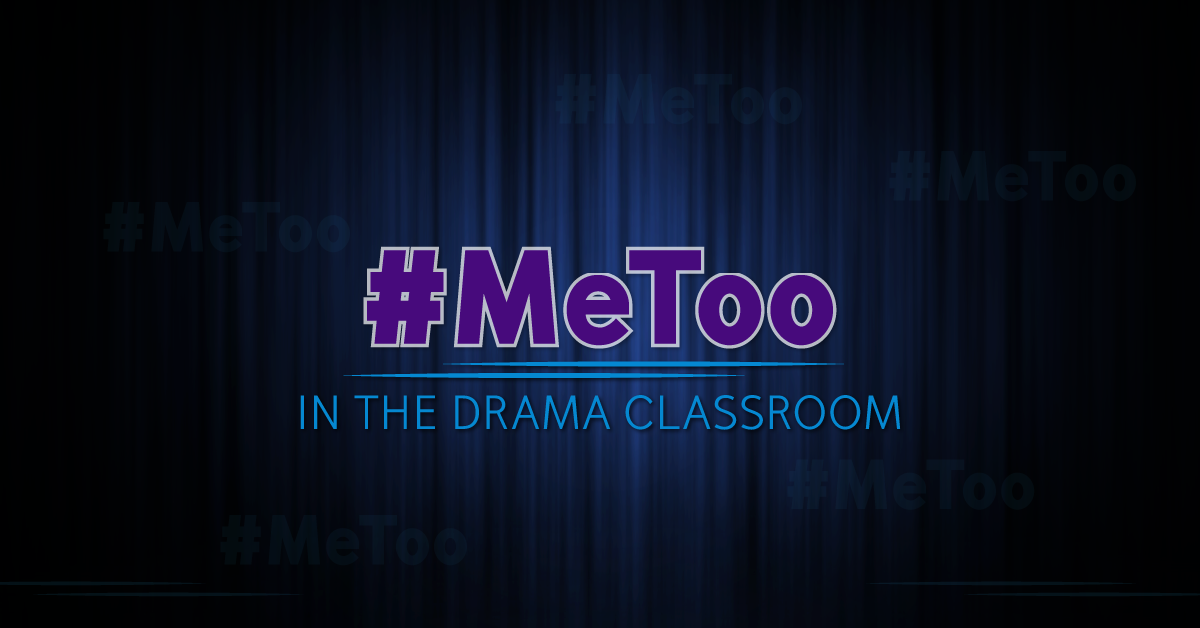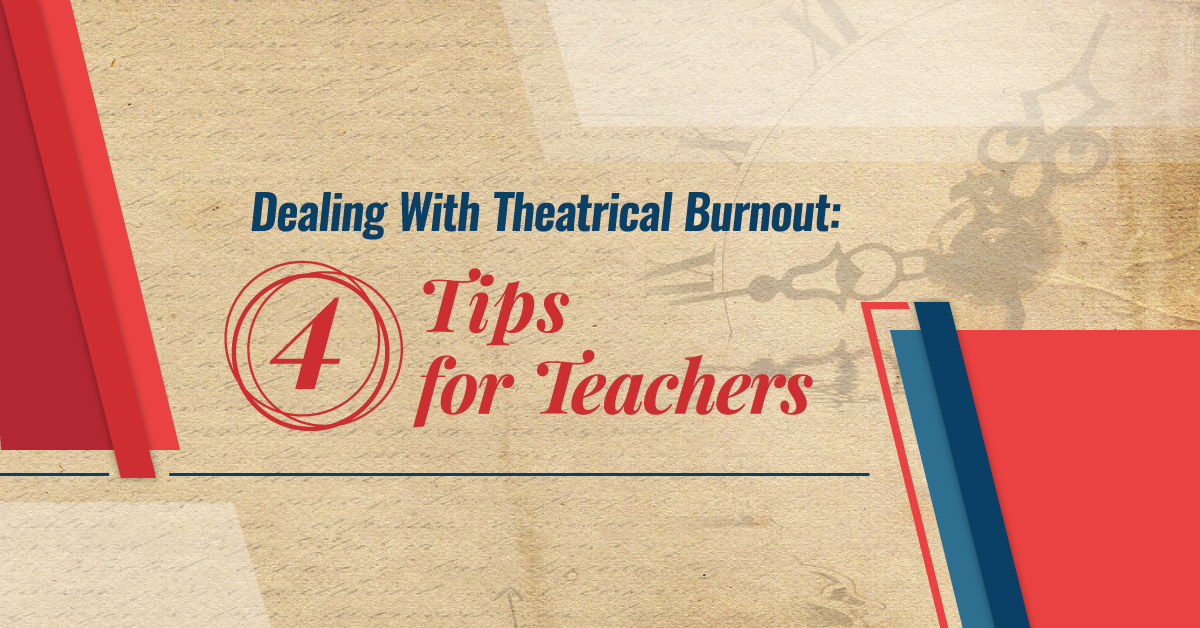#MeToo in the Drama Classroom
Nineteen million people tuned in to watch the 2018 Golden Globes. And I bet you a number of them were students (maybe some in your classroom), and many were drama educators. Listening to the speeches, which focused on equity, empowerment, and community, made me realize the important role that drama educators have in this conversation.
The #MeToo conversation is difficult for adults. It is even more difficult for young people. Students are watching as some actors, directors, and producers they have admired in the world of Hollywood are accused of abuse of power. They are also learning of actors and other artists who have been mistreated and/or abused.
We, as teachers, have a responsibility to change the thought processes and culture that allow #MeToo situations to take place. Although not all of our students will ultimately pursue a career in the performing arts, we still have an obligation to teach consent.
Our students have a responsibility to change how people are treated now and how they will be treated in our future. We must teach respect. We must teach our students to expect respect. We must also show our students respect, and allow our students to be provided with the opportunity to be asked for consent.
I wanted to take ownership of this responsibility. I decided to sit down and write a manifesto for my classroom. I thought of teacher responsibilities and student responsibilities. I am hoping that by sharing this I might inspire you to create your own manifesto from some thoughts of your own. You could choose to share this with your students, or even build the manifesto together with your students. I believe the reflection is important.
The Manifesto
Teacher Responsibilities:
1) Students have the right to say no.
I remember in theatre school (at times, not always) feeling as if I could not say no to a director (HE was in THE BUSINESS and I wanted to make a good impression). Students should not be afraid to ask for alternatives in fear that it will affect how they are perceived, or that it might jeopardize future opportunities.
2) Teachers have a responsibility to ensure all performers feel comfortable.
In high school and in theatre school I was very self conscious about my body. I was often given costumes that I did not feel comfortable wearing. When given a costume to wear, you were not asked for your opinion or input. Actors take risks when they perform; they should be able to feel as comfortable and confident as possible.
3) Don’t assume that kids are okay with content.
As drama educators we often explore difficult topics. Ensure your actors, crew, and supporters (audience members) are comfortable, and/or have the support they need to are explore difficult topics. Tell the stories that your students feel the need to tell. Provide warnings to audiences about difficult topics that will be explored in your plays. Perhaps provide a Q&A after the show to guide the discussion. Think about the most vulnerable person in the audience – what message might they be leaving with?
4) Remember: teachers have power.
Choose to use that power to empower students. Create an environment that allows students to feel they have a voice in what they do. Teachers have a power. The role itself requires us to have power. How we use that power can have a huge impact on our students.
5) Consider blind casting.
Traditionally, casting was dependent on what the actor looked like. A number of shows, such as Hamilton, are choosing to cast the best person for the role vs. basing it on the actor’s appearance. This is a choice I encourage all teachers to make.
6) Your words matter.
Often students look up to teachers. Our words matter. The comments we make and the feedback we provide, all need to support students in their physical, mental and social wellbeing.
7) Ensure that there are opportunities for all students.
I am guilty of this one. At the start of my career I often chose plays that had male leads. Now this is not to dismiss the role of supporting cast members, but I realized I needed to make an effort to ensure that there was more variety in the stories that were being told. This choice didn’t didn’t have to focus on gender, but it did require variety in whose stories were being told.
8) Ensure that students are aware that performers should feel safe.
I recently had a conversation with my giggly Grade 9 students about the job of an Intimacy Director. Earlier in the semester we had a Stage Combat Director come into class to teach unarmed stage combat. I had explained that an Intimacy Director developed choreography for things like hugging, kissing or even a touch, because, just like Stage Combat, everyone has the right to feel safe. This was a giggly conversation, but it was an important one. Everyone needs to feel safe on stage no matter what kind of relationship they are demonstrating. Actors must be asked for consent before being touched in any manner.
9) Make sure students know you respect them.
We all want to put on the best performance we can, and we can only do that if we are in this process together. Students need to know that you are there to support them – to problem solve together, to collaborate. Students need to understand that this is your role.
Student Responsibilities:
1) You have the right to feel safe.
Your wellbeing is a priority. Ensure you speak up if you do not feel emotionally, mentally or physically safe.
2) You have the right to feel comfortable.
When you are on stage, you are taking a risk. You need feel comfortable doing so.
3) You have the right to be heard.
Share your opinions. Discuss stories that you think should be told.
4) You have the right to disagree.
You have the right to ask questions and to discuss disagreements.
5) If you notice that another student feels uncomfortable, please speak up on their behalf.
Be the voice for another if they feel voiceless.
6) You are an artist.
You deserve respect for this important role in society. You expose the truth. This is an honourable role.
The only way we can change the issues being exposed by the #MeToo movement is to give all people power. We all deserve the right to build creative work, and to feel safe and respected while doing so. We all have the right to advocate for ourselves and to have the strength and courage to tell stories to change society. Students need to know this.
We, as teachers, have the responsibility to ensure that our students know that they have value and that the stories we tell have an importance too. If we want to change the experiences of actors in the future, we need our future actors, directors, and producers to know that their worth is based in their creative talents. We need to ensure that respect and consent are part of the process. This is the only way to change #MeToo.
Click here for a Student Responsibilities poster to share in your drama classroom.
_ Claire Broome is a Drama teacher, Lead Teacher for the Arts and Culture Specialist High Skills Major program, and Curricular Head of the Arts at John Fraser Secondary School in Mississauga, Canada. Claire is a graduate of the Theatre and Drama Studies program at UTM and Sheridan College._
In her “spare” time Claire writes plays, and collaborates with students to create a Youtube show called “Student Government”. In her younger days, Claire performed in touring children’s theatre shows.



